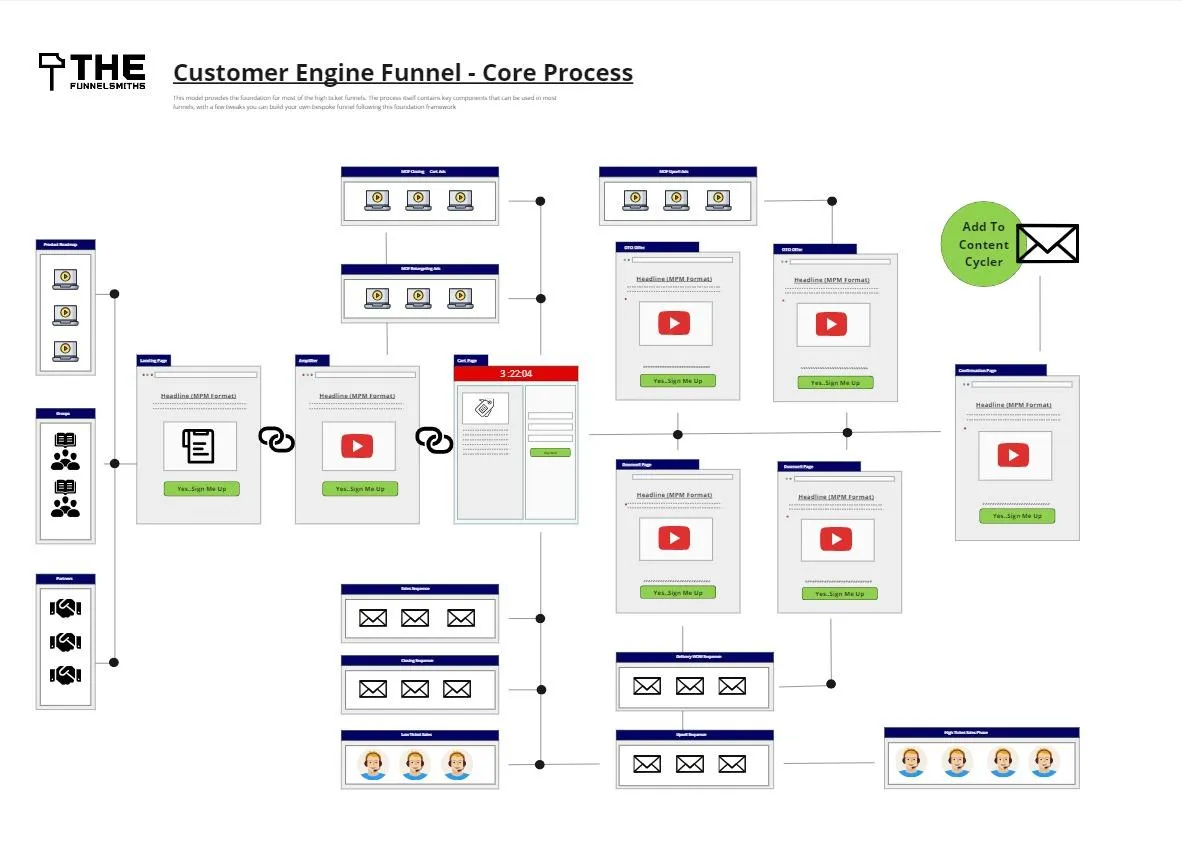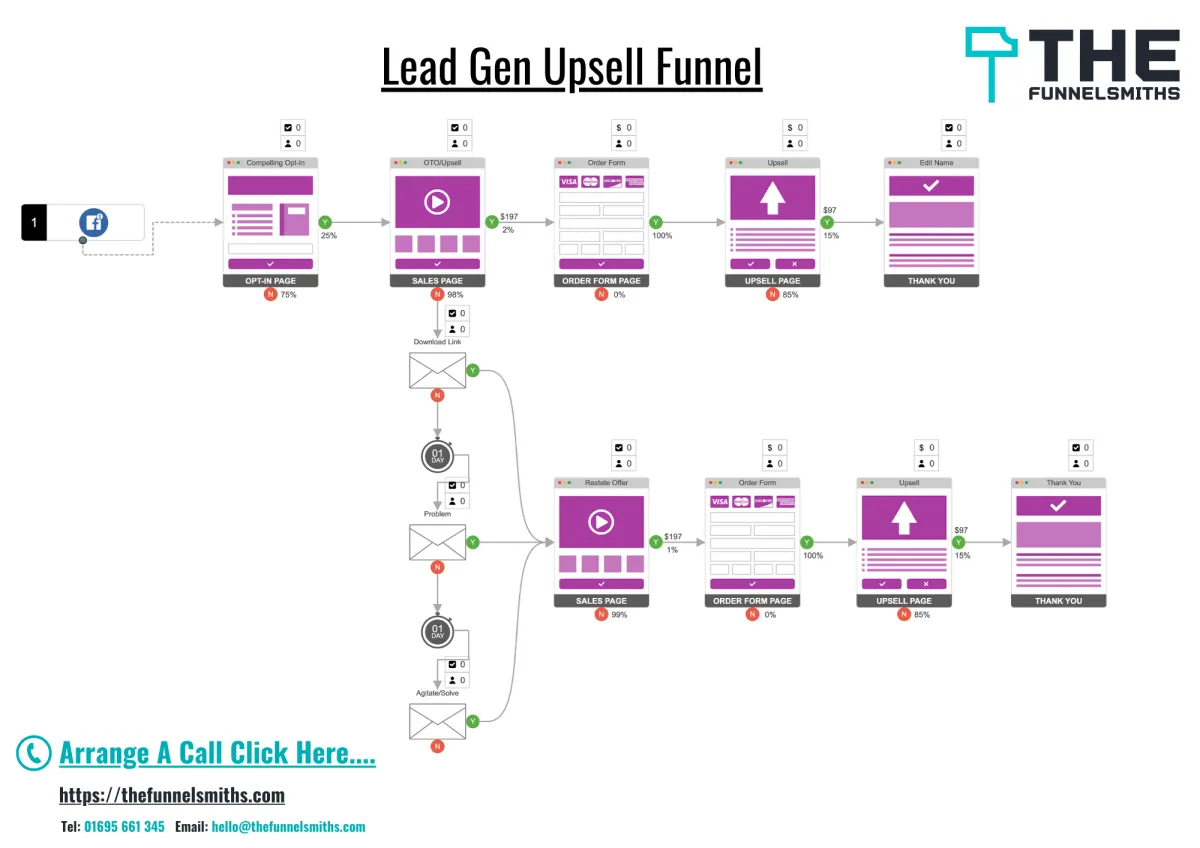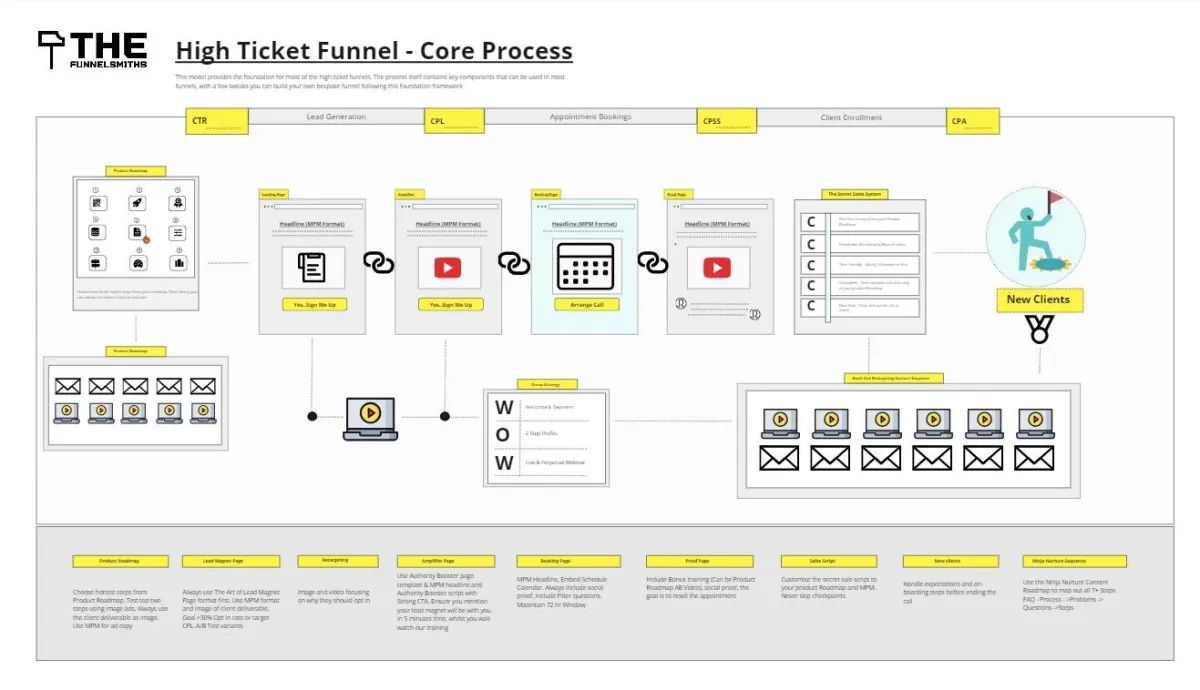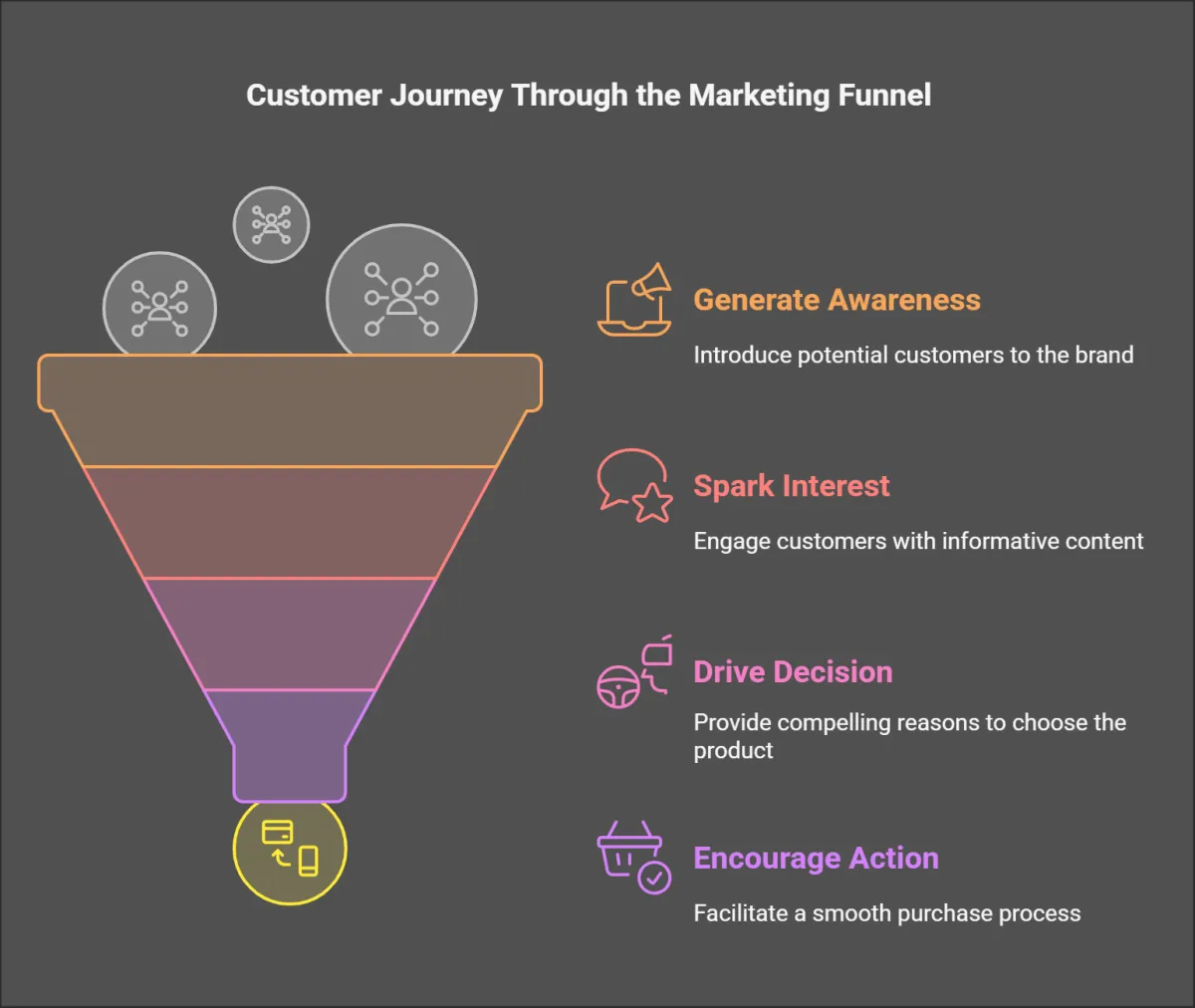Tel: 01695 661 345 Email: [email protected]

An Introduction To Sales Funnels
Accountancy Sales Funnels
A sales funnel is comprised of a series of pages or steps which are designed to take your prospect down a specific path and to achieve a specific outcome, usually to either capture potential customers details or to make a direct sale.
The steps within a sales funnel usually are representative of the stages of the marketing funnel, TOF (top of the funnel), MOF (middle of the funnel), BOF (bottom of the funnel) and emulate the stages of awareness, interest, engagement, action and retention found in marketing funnels. the idea being you are taking cold prospects and building rapport and trust with them until they make the decision to purchase.
The first step in an accountancy sales funnel see's the most traffic, a percentage of which will either sign up or make a purchase, this is then immediately followed by an upsell or additional offer increasing overall customer value, using triggers to yield more sales or arrange a sales call.
There are different types of sales funnel that are applicable to the various types of product or accountancy service, and are applied both through price point and/or the desired action you wish a customer to take.
Because a accountancy sales funnel are focused on one goal. It will usually have a much higher conversion rate than that of a website, meaning you can generate more customers and maximise traffic and ad spend.
Get Your Free Lead Generation Guide For Accountancy Practices
A Quick Start Guide On How To Generate 10 - 30 Booked Calls Every Month.
Click the link below and follow the steps to get instant access.

Download Our Free Sales Funnel Blueprints
Download 12 tried and tested Sales Funnel blueprints
completely free of charge. Start your project today
What are the benefits of a sales funnel if your an Accountant?

A Streamlined Customer Journey:
A sales funnel takes potential customers from awareness to action in a structured and logical way, ensuring they receive the right information at the right stage in the buying process for your accountancy practice. It is also designed to build trust by delivering information in a drop fed way, reducing the risk of losing potential customers as you may experience with a website.

Higher Conversion Rates
One of the main challenges with a website is that it has multiple key messages and services, which can often cause confusion for a user, its this confusion which reduces the likelihood of a customer enquiring or taking the next action. By only focusing on one outcome, a sale funnel channels user more precisely, with simplified messaging which aides conversion.

Automation And Scalability
A key part of any sales funnel is the follow up, which is crucial for higher conversions. By using automation you can stay engaged with customers over a longer period increasing the likelihood of them becoming customers. There has been research completed by Forrester Research that found businesses with effective lead nurturing strategies generated a minimum of 50% more sales leads at a 33% lower cost per lead compared with competition.

Improved Lead Quality:
As the content and intent of a sales funnel is highly focused, it by default filters out more unqualified customers, meaning the lead quality of leads that actually enquire are of a higher quality.

Data Driven insights
Accountancy Funnels provide detailed analytics on how prospects engage with your content, by using this data you can spot bottlenecks and improve the overall effectiveness of your sales funnel much more easily.

Cost effectiveness
The cost per lead is usually much lower using a sales funnel as paid traffic is efficiently converted into leads, minimising wasted ad spend. You can also maximise revenue using upsells and maximising revenue per customer.
What Are The Different Types Of Accountancy Sales Funnels?
There are many different types and combinations of sales funnels depending on the desired outcome. Some of the more common sales funnels are:

Types Of Sales Funnel:
Lead generation funnel
The Tripwire or Low ticket sales funnel
Liquid Funnels
Webinar funnels
Quiz Funnels
Product Launch Funnels
High Ticket Funnels
Ecommerce funnels
Evergreen Funnels
Local Business Funnels
Group Funnels
In the main these are all built up from 3 core sales funnel mechanisms the High Ticket Funnel, The Webinar Funnel and The Low Ticket Funnel (Trip Wire). These provide the core building blocks that makeup the other funnel types and through combinations of these elements you can stack and link funnels, to create extremely advanced funnel systems.
How Do Sales Funnels Work?
The premise of an accountancy sales funnel is to attract, nurture and convert a potential prospect into a paying customer.
Sales funnels are a structured process designed to guide potential customers through the stages of awareness, interest, decision, and action. At the top of the funnel, businesses attract attention through ads, social media, or other marketing efforts, introducing prospects to their brand. As leads move further down the funnel, they engage with lead magnets, targeted content, , videos, or email sequences, which address their needs, overcome problems and educate and so build trust. The funnel narrows as prospects consider the value of the product or service, often influenced by testimonials, case studies, or free trials. Finally, at the bottom of the funnel, a clear and compelling call-to-action encourages the prospect to make a purchase or take the desired step. Each stage of the funnel is carefully designed to nurture leads, overcome objections, and maximise conversions.

The methods and structure of the funnels as previously mentioned can be somewhat different depending on the outcome, but all are focused on taking a prospect on a journey, building trust to the point at which they convert into paying customers.
Sales funnel marketing as become more popularised in recent years through key figures such as Russel Brunson, Dan Kennedy, Gusten Sun, Frank Keirn, Aaron Fletcher, Neil Patel to name a but a few Funnel advocates, all promoting the key benefits of using funnels to accelerate your revenue and scale your business.
The methods and structure of the funnels as previously mentioned can be somewhat different depending on the outcome, but all are focused on taking a prospect on a journey, building trust to the point at which they convert into paying customers.
STILL NOT SURE?
Frequently Asked Questions
Sales funnel marketing as become more popularised in recent years through key figures such as Russell Brunson, Dan Kennedy, Gusten Sun, Frank Keirn, Aaron Fletcher, Neil Patel to name a but a few Funnel advocates, all promoting the key benefits of using funnels to accelerate your revenue and scale your business.
Do Funnels just work for Accountancy practices?
Sales funnels work for any business, they are flexibility and versatility mean you can promote your core products or services in a more const effective way, maximising revenue and the process of converting prospects onto customers. Its also often a cheaper option than building a full website, which will undoubtedly convert at a lower rate.
How long does it take to see results?
Usually it does take a little bit of tweaking to get your sales funnel working optimally, but you will see results almost immediately as a large proportion of the traffic is driven via paid ads.
Do you provide custom funnel solutions?
Yes, our funnels are designed around your business and products, we consult with you first to understand your goals and what you are trying to achieve. We can then recommend the right funnel structure for you're business.
What is a good sales lead?
A good sales lead is a prospect that fits your ideal customer profile and is in a position to buy your product or services. Sales funnels optimise this process allowing you to add in pre-qualification elements to ensure you only have high quality leads coming through.
How do you build a sales funnel?
There are different softwares that will help you build sales funnels, although there is a steep learning curve in learning both how to esign the right funnel for your business as well as the more technical aspects of how you actually build the infrastructure.
